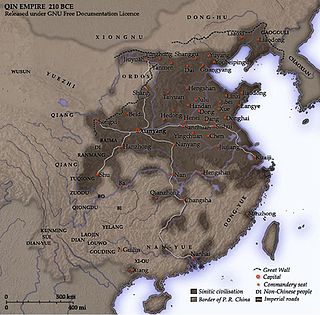Related Research Articles

Hu is a Chinese surname. In 2006, it was the 15th most common surname in China. In 2013, it was the 13th most common in China, with 13.7 million Chinese sharing this surname. In 2019, Hu was the fifteenth most common surname in Mainland China.

The Hu–Wen Administration, or Hu–Wen New Administration is the name given to the Chinese leadership that officially succeeded Jiang Zemin, Li Peng and Zhu Rongji in 2002. Using the two leaders' surnames, it is abbreviated as Hu–Wen.

The gaohu is a Chinese bowed string instrument developed from the erhu in the 1920s by the musician and composer Lü Wencheng (1898–1981) and used in Cantonese music and Cantonese opera. It belongs to the huqin family of instruments, together with the zhonghu, erhu, banhu, jinghu, and sihu; its name means "high-pitched huqin". It is the leading instrument of Cantonese music and opera ensembles. Well known pieces for the gaohu include Bu Bu Gao and Ping Hu Qiu Yue.

Hu Hanmin was a Chinese philosopher and politician who was one of the early conservative right factional leaders in the Kuomintang (KMT) during revolutionary China.
Hu Jia is a male Chinese diver who won the gold medal at the 2004 Summer Olympics in the men's 10 metre platform. He was in sixth place at the end of the preliminary round, and fourth place after the semi-finals, but put in an excellent performance in the finals to take first place.
The huluhu is a Chinese bowed string instrument in the huqin family of instruments. It has two strings, and its sound box is made from a gourd, with a face made of thin wood. It is used primarily by the Zhuang people of the southern Chinese province of Guangxi.
The maguhu is a Chinese bowed string instrument in the huqin family of musical instruments. It has two strings and its sound box is made from the femur bone of a horse. The front end of the sound box is covered with snake skin, and the end of the neck is carved in the shape of a horse's head.

Donghu or Hu was a tribal confederation of nomadic people that was first recorded from the 7th century BCE and was destroyed by the Xiongnu in 150 BCE. They lived in northern Hebei, southeastern Inner Mongolia and the western part of Liaoning, Jilin and Heilongjiang along the Yan Mountains and Greater Khingan Range.

Hu Jun is a Chinese actor best known for playing dramatic roles in various films and television series. He has acted in a number of Hong Kong films.
Hu Weidong is a former Chinese professional basketball player. At 6'6" tall, and 210 lbs. (95 kg), he played as a point guard-shooting guard-small forward.

Hu Ge, also known as Hugh Hu, is a Chinese actor and singer. While studying at the Shanghai Theater Academy, he was invited to play the leading role Li Xiaoyao in the 2005 television series Chinese Paladin, and immediately skyrocketed to fame as one of China's most popular actors. Since then, he has starred in several iconic historical television series; such as The Little Fairy (2006), The Young Warriors (2006), The Legend of the Condor Heroes (2008), Chinese Paladin 3 (2009), The Myth (2010), Xuan-Yuan Sword: Scar of Sky (2012) and Sound of the Desert (2014). In September 2012, he was nominated for Best Newcomer at the 31st Hundred Flowers Awards for his role as Lin Juemin in Chinese historical film 1911 (2012). Hu gained widespread acclaim with his roles as Ming Tai in the spy drama The Disguiser (2015) and Mei Changsu in the wuxia drama Nirvana in Fire, for which he received the Best Actor Award at the 22nd Magnolia Awards and the Golden Eagle Awards. He ranked 24th on the Forbes China Celebrity 100 List for 2020.

Hu Chunhua is a Chinese politician, a member of the Politburo of the Chinese Communist Party (CCP), and a Vice Premier of the People's Republic of China. He worked in Tibet for much of his career and ascended the party ranks partly through the Communist Youth League. He is popularly known as "little Hu" due to the similarities of his career with that of former CCP General Secretary Hu Jintao. He became China's youngest governor when he took the position in Hebei province in 2008. He was then promoted to Party Secretary of Inner Mongolia in 2009. In 2012, he was named Communist Party Secretary of Guangdong and entered the Politburo.
Hu Binyuan is a male Chinese sports shooter who competed in the 2004 Summer Olympics, 2008 Summer Olympics and the 2012 Summer Olympics.
Hu Zhaojun is a Chinese football player.

Hu Yun is a retired badminton player representing Hong Kong since 2006. He competed at the 2010 and 2014 Asian Games, and also 2016 Rio Olympics. Born in Wuhan, Hubei, China, Hu started playing badminton in 1988, and participated in local province badminton teams at an early age. In 2006, he started to represent Hong Kong at international tournaments. He won the Hong Kong National Badminton Championships four times, in 2007, 2009, 2010, and 2012.
Terry Hu is a Taiwanese actress, writer and translator.
Hu Yueyue is a Chinese former tennis player.
Hu Yanliang, also known as Karen Hu, is a Chinese beauty pageant titleholder who was Miss Universe China 1st Runner-up in 2014 session and represented her country at the Miss Universe 2014 pageant in the United States after the title was transferred to her from the original winner Nora Xu.
Hu Hongwen was a Chinese organic chemist, educator and an academician of the Chinese Academy of Sciences (CAS). He was known as the Chief editor of Chinese higher education textbook Organic Chemistry.
Hu Ping was a Chinese politician. Born in Jiaxing, Zhejiang, he was a member of the Chinese Communist Party and was Governor of Fujian from 1983 to 1987. He was also the Minister of Commerce from 1988 to 1993.